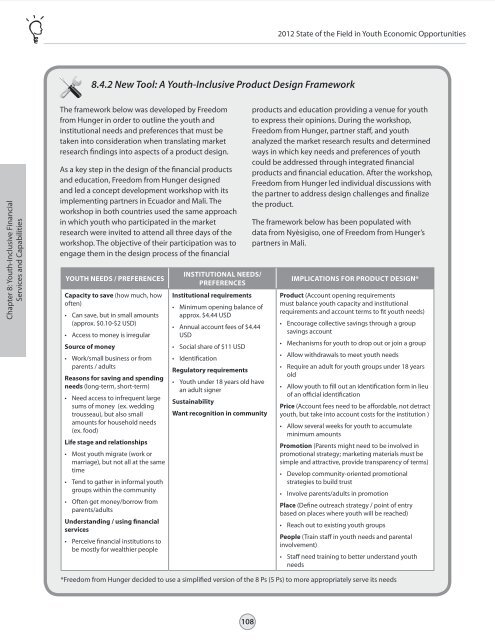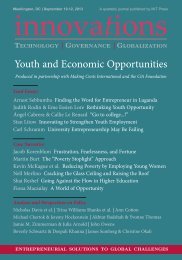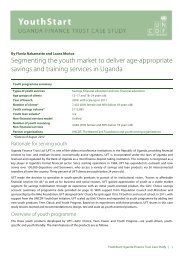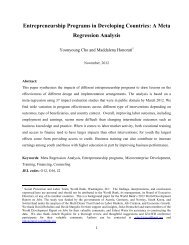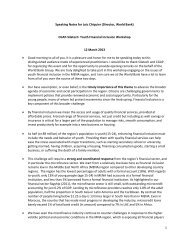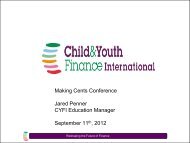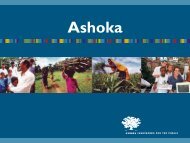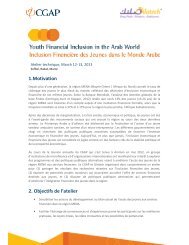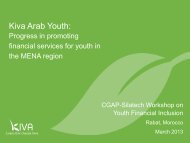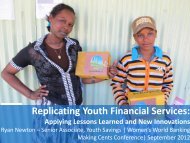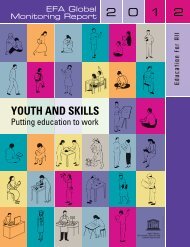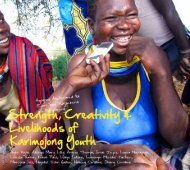STATE OF THE FIELD IN YOUTH ECONOMIC OPPORTUNITIES
STATE OF THE FIELD IN YOUTH ECONOMIC OPPORTUNITIES
STATE OF THE FIELD IN YOUTH ECONOMIC OPPORTUNITIES
Create successful ePaper yourself
Turn your PDF publications into a flip-book with our unique Google optimized e-Paper software.
Table of Contents<br />
Chapter 1 Chapter 2 Chapter 3 Chapter 4 Chapter 5 Chapter 6 Chapter 7 Chapter 8<br />
Chapter 9<br />
Chapter 10 Chapter 11 Chapter 12 Chapter 13 Chapter 14 Chapter 15 Annexes<br />
2012 State of the Field in Youth Economic Opportunities<br />
8.4.2 New Tool: A Youth-Inclusive Product Design Framework<br />
Chapter 8: Youth-Inclusive Financial<br />
Services and Capabilities<br />
The framework below was developed by Freedom<br />
from Hunger in order to outline the youth and<br />
institutional needs and preferences that must be<br />
taken into consideration when translating market<br />
research findings into aspects of a product design.<br />
As a key step in the design of the financial products<br />
and education, Freedom from Hunger designed<br />
and led a concept development workshop with its<br />
implementing partners in Ecuador and Mali. The<br />
workshop in both countries used the same approach<br />
in which youth who participated in the market<br />
research were invited to attend all three days of the<br />
workshop. The objective of their participation was to<br />
engage them in the design process of the financial<br />
<strong>YOUTH</strong> NEEDS / PREFERENCES<br />
Capacity to save (how much, how<br />
often)<br />
• Can save, but in small amounts<br />
(approx. $0.10-$2 USD)<br />
• Access to money is irregular<br />
Source of money<br />
• Work/small business or from<br />
parents / adults<br />
Reasons for saving and spending<br />
needs (long-term, short-term)<br />
• Need access to infrequent large<br />
sums of money (ex. wedding<br />
trousseau), but also small<br />
amounts for household needs<br />
(ex. food)<br />
Life stage and relationships<br />
• Most youth migrate (work or<br />
marriage), but not all at the same<br />
time<br />
• Tend to gather in informal youth<br />
groups within the community<br />
• Often get money/borrow from<br />
parents/adults<br />
Understanding / using financial<br />
services<br />
• Perceive financial institutions to<br />
be mostly for wealthier people<br />
<strong>IN</strong>STITUTIONAL NEEDS/<br />
PREFERENCES<br />
Institutional requirements<br />
• Minimum opening balance of<br />
approx. $4.44 USD<br />
• Annual account fees of $4.44<br />
USD<br />
• Social share of $11 USD<br />
• Identification<br />
Regulatory requirements<br />
• Youth under 18 years old have<br />
an adult signer<br />
Sustainability<br />
Want recognition in community<br />
products and education providing a venue for youth<br />
to express their opinions. During the workshop,<br />
Freedom from Hunger, partner staff, and youth<br />
analyzed the market research results and determined<br />
ways in which key needs and preferences of youth<br />
could be addressed through integrated financial<br />
products and financial education. After the workshop,<br />
Freedom from Hunger led individual discussions with<br />
the partner to address design challenges and finalize<br />
the product.<br />
The framework below has been populated with<br />
data from Nyèsigiso, one of Freedom from Hunger’s<br />
partners in Mali.<br />
IMPLICATIONS FOR PRODUCT DESIGN*<br />
Product (Account opening requirements<br />
must balance youth capacity and institutional<br />
requirements and account terms to fit youth needs)<br />
• Encourage collective savings through a group<br />
savings account<br />
• Mechanisms for youth to drop out or join a group<br />
• Allow withdrawals to meet youth needs<br />
• Require an adult for youth groups under 18 years<br />
old<br />
• Allow youth to fill out an identification form in lieu<br />
of an official identification<br />
Price (Account fees need to be affordable, not detract<br />
youth, but take into account costs for the institution )<br />
• Allow several weeks for youth to accumulate<br />
minimum amounts<br />
Promotion (Parents might need to be involved in<br />
promotional strategy; marketing materials must be<br />
simple and attractive, provide transparency of terms)<br />
• Develop community-oriented promotional<br />
strategies to build trust<br />
• Involve parents/adults in promotion<br />
Place (Define outreach strategy / point of entry<br />
based on places where youth will be reached)<br />
• Reach out to existing youth groups<br />
People (Train staff in youth needs and parental<br />
involvement)<br />
• Staff need training to better understand youth<br />
needs<br />
*Freedom from Hunger decided to use a simplified version of the 8 Ps (5 Ps) to more appropriately serve its needs<br />
108


